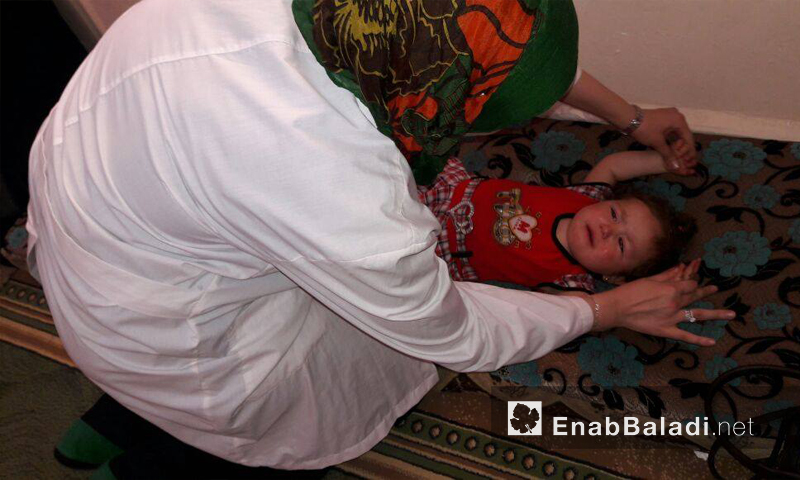Nadia Zaidan, a 27-year-old physiotherapist, has voluntarily continued her revolutionary acts after three of her brothers were killed separately.
Volunteer work has become the oil in the wheel of liberated areas. Some volunteers are remunerated for their services, while others give not just their time, but sometimes even contribute to the costs of the work they do.
Nadia’s volunteering career began with the revolution’s very first demonstrations, and was later followed by sporadic acts she participated in along with her brothers, who were but a few years older than her. They distributed aid and sheltered displaced people in their house; Nadia at times put her life at risk when delivering aid from the city of Idlib, where she lived, to the liberated countryside. Even after the murder of her brothers, she continued her work alone.
In March 2012, when Assad’s forces took the city of Idlib, some women delivered aid to revolutionary fighters, who had left the city for the liberated countryside. These women may also have delivered weapons to them at a time when the rebels suffered greatly by staying out in the surrounding farms.
In March 2015, after the liberation of the city, Nadia worked with a group of her friends to renovate schools in the city, preparing them for functioning again. After that, she travelled to Turkey to learn physiotherapy and spent two months at ‘Dar Estishfa’ (the ‘Healing House’) in Rihaniya.
Nadia is a graduate of Arabic Literature, and had no previous experience of therapy. However, the dire need for this kind of treatment in her city made Nadia take the decision to go to Rihaniya at her own expense. When she returned, she established the ‘Wadaq’ Centre with her colleagues – this was the first physical therapy center in the city.
The ‘Wadaq’ Center has seven volunteers – three young women and four young men – who work for four hours a day. Some come from the city of Idlib, where the center is located, while others bear the burden of having to travel to the center without being reimbursed for their transportation fees.
Despite the physical exhaustion she suffered through her work as a physiotherapist, the thanks people gave Nadia for her work always motivated her to offer more.
Nadia’s next stop was ‘Ber Association’, where she allocated two hours a day to work in the area of relief. Intermittently, she would also go to several Women’s Associations to help them with their activities.
Organizations and Associations accept volunteer applications regularly. Some volunteers work long-term and are paid for their services, however the majority of volunteers work on a temporary basis and with no remuneration. Volunteer work can vary and includes some of the most dangerous tasks, such as working in ambulance teams and the rescuing the injured; the peak time for which is after each shelling.
Iman As-Shami, an official at the Rakeen Organization, tells Enab Baladi that “these young people have no other choice but to volunteer due to the lack of employment opportunities. This volunteer work might therefore compensate them somewhat, and make their living circumstance more bearable.”
Nadia’s third brother was killed during to the ongoing shelling over Idlib. As a result, she stopped working for a few days, but resumed after that. She says “volunteer work is a different kind of Jihad. It has its own pleasure, away from more routine work, and not to mention its reward in the afterlife – this will be greater than any financial reward

